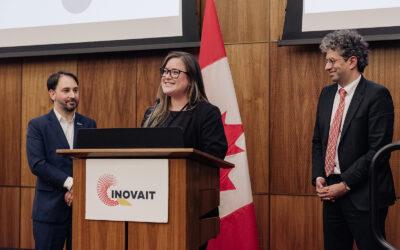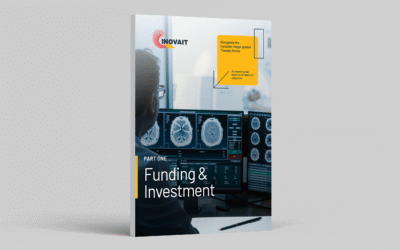September 20, 2022 | Toronto, ON – INOVAIT, the pan-Canadian network supported by the Government of Canada’s Strategic Innovation Fund, is pleased to announce additional recipients of its Pilot Fund. This competitive funding was awarded to further image-guided therapy (IGT) projects, including the integration of artificial intelligence (AI) and big data analytics to advance medical innovation.
A total of $3.4M in contributions were committed to supporting 28 new projects that involve collaborations between small- and medium-sized enterprises, hospital research centres, and academic institutions across the country. These organizations are each taking an innovative approach to using AI and data capabilities to enhance their IGT offerings, ultimately strengthening the sector and delivering health benefits to Canadians and people around the world. The 28 projects are worth a combined investment of $12.7M from all organizations involved, and INOVAIT is proud to contribute funding to help offset costs of some of the most innovative and impactful projects in the field.
“This funding is designed to encourage the commercial translation of research and development, accelerate commercialization of products, facilitate the growth and expansion of firms, and advance industrial research and technology demonstration activities through collaboration,” says Raphael Ronen, Co-Director of INOVAIT. “With the first funding round now complete, a grand total of 40 projects have been funded, and $4.9M has been injected into Canada’s image-guided therapy industry.”
Funding was provided to projects that demonstrated the highest commercialization potential and economic impact, supporting members like Cohesic Inc. in Calgary, AB and Altis Labs in Toronto, ON.
- Cohesic Inc., in collaboration with Sunnybrook Research Institute and HeartVista, is working on a project that will facilitate ground-breaking studies using cardiac magnetic resonance (CMR) to identify heart tissue biomarkers and determine their relationship with downstream clinical outcomes, allowing for patient phenotyping and personalized medicine. The team will also develop rapid, patient-friendly MRI techniques to ensure that their innovations will benefit the greatest number of Canadians.
- Altis Labs, collaborating with University Health Network, is aiming to validate a deep learning (DL) system that could inform and expedite optimal treatment decisions in early-stage lung cancer patients. The system will automatically generate a recurrence risk score and predict pulmonary function test (PFT) results from standard-of-care pre-treatment CT scans. A more accurate prognosis could guide a more personalized approach to treatment and inform whether a patient might benefit from treatment intensification or de-escalation. The PFT prediction could expedite treatment decisions and triage patients for more selective use of PFTs.
“Canada is a global leader in AI and image-guided therapy, and that wouldn’t be possible without our world-leading innovative companies,” says the Honourable François-Philippe Champagne, Minister of Innovation, Science and Industry. “By supporting these projects, we are fostering new innovative medical solutions that will bring important benefits to Canadians.”
INOVAIT will be announcing the details of a new call for applications for the Pilot Fund in the coming weeks. Visit our website and join our mailing list for our latest announcements.
For a full list of companies funded to date through INOVAIT, visit www.inovait.ca/funding.
For any inquiries regarding INOVAIT or its programming, please reach out to inovait@sunnybrook.ca .



